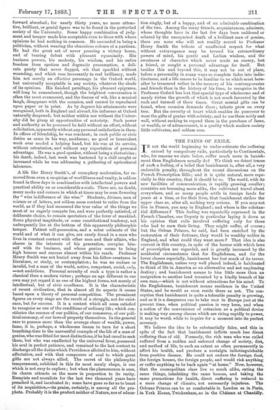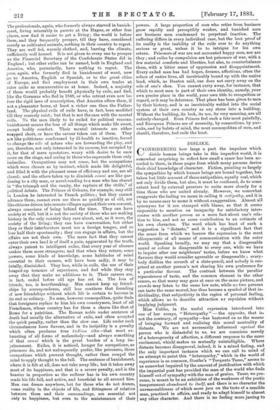THE PAINS OF EXILE.
IS not the world beginning to under-estimate the suffering caused by compulsory exile, particularly to Continentals, who, for reasons we state below, suffer much more in banish- ment than Englishmen usually do? We think we detect traces of such a feeling, of a belief that banishment is, after all, a very endurable penalty, throughout the recent discussions on the French Proscription Bills ; and it is quite natural, more espe- cially in this country, that it should be so. The world, with its new facilities of communication, is rapidly growing smaller; countries are becoming more alike, the cultivated travel about everywhere, and so many people settle in foreign lands for years at a time, or for their lives, that banishment strikes the upper class as, after all, nothing very serious. If you may not live in France, you may in England ; and where is the substan- tial difference? This feeling was repeatedly expressed in the French Chamber, one Deputy in particular laying it down as his opinion that exile involved suffering only for those who had to earn their living. They might suffer, of course ; but the Orlean Princes, he said, had been enriched by the restoration of their fortunes, they would be wealthy nobles in England, and what could they want more ? That idea is also current in this country, in spite of the horror with which laws of proscription are regarded, and is greatly increased by the accidental circumstance that for Englishmen, and for the lower classes especially, banishment has lost much of its terror. The Englishman, unless very well placed indeed, is habituated to think of life in America as an alternative and not unpleasing destiny ; and banishment means to him little more than an emigration to another land tenanted by a kindly branch of his own race,—which is not without attractions for his mind. To the Englishman, banishment means residence in the United States, and he would as soon reside there as not. The con- ception that banishment is quite a tolerable penalty is growing, and as it is a dangerous one to take root in Europe just at the present time, when political passion is very keen, and when a notion of the convenience of ostracism as a political device is making way among classes which are rising rapidly to power; it may be worth while to inquire for a moment into its perfect accuracy.
We believe the idea to be substantially false, and this in spite of the fact that banishment inflicts much less direct suffering than of old. Formerly, the rich man who was exiled suffered from a sudden and enforced change of society, diet, and method of life, to such an extent as often permanently to affect his health, and produce a nostalgia indistinguishable from positive disease. He could not endure the foreign food, the foreign houses, the foreign people, and would risk anything or suffer anything to be back again "at home." Now, however, that the cosmopolitan class live so much alike, eating the same things, inhabiting the same houses, and taking the same precautions for health, direct suffering is reduced to a mere change of climate, not necessarily injurious. The Orleans Princes can be as comfortable in London as in Paris, in York House, Twickenham, as in the Château at Chantilly.
The professionals, again, who formerly always starved in banish- ment, living miserably in garrets at the Hague, or other free places, now find it easier to get a living ; the world is before them, and they frequently prosper, till they have, considered merely as cultivated animals, nothing in their country to regret. They are well fed, warmly clothed, and, barring the climate, sufficiently well housed. It is not given to every one to prosper as the Financial Secretary of the Confederate States did in England ; but other exiles can be named, both in England and America, who, pecuniarily, have nothing to regret. The poor, again, who formerly died in banishment of want, now go to America, English or Spanish, or to the great cities of Europe, and find employment in their own trades at rates quite as remunerative as at home. Indeed, a majority of them would probably benefit physically by exile, and find, like the Germans who fled in 1848, or who retreat even now be- fore the rigid laws of conscription, that America offers them, if not a pleasanter home, at least a richer one than the Father- land. The physical evils of exile have, in fact, been modified till they scarcely exist ; but that is not the case with the mental evils. To the men likely to be exiled for political reasons, banishment means the loss of all things which make life sweet, except bodily comfort. Their mental interests are either snapped short, or have the savour taken out of them. They are like politicians condemned by ill-health to inaction, forced to change the role of actors who are forwarding the play, and are, therefore, not only interested in its success, but occupied by it, for that of mere spectators, weary with desire to be once more on the stage, and seeing in those who supersede them only imbeciles. Occupations may not cease, but the occupations which were chosen as by instinct, which made life delightful, and filled it with the pleasant sense of efficiency and use, are all closed; and the others taken up to diminish ennui are like gar- dening to a city man, or novel-reading to a man who has shared in "the triumph and the vanity, the rapture of the strife," of political debate. The Princes of Orleans, for example, may still in London be interested in French politics ; but they cannot advance them, cannot even see them as quickly as of old, are like citizens driven into remote villages against their own consent, always conscious of being behind the time. They can have society at will, but it is not the society of those who are making history in the only country they care about, not, as it were, the society of the living ; they can have conversation, but either they or their interlocutors must use a foreign tongue, and so lose half their spontaneity ; they can engage in affairs, but the affairs are not their own. The mere fact that they cannot enter their own land is of itself a pain, aggravated by the truth, always patent to intelligent exiles, that every year of absence makes them more strangers; and that when they return, some powers, some kinds of knowledge, some habitudes of mind essential to their careers, will have been sadly, it may be fatally, diminished. They lose, while in exile, the use of their heaped-up treasure of experience, and feel while they stay away that they make no additions to it. Their careers are, in fact, ended before old age has set in. The loss of friends, too, is heartbreaking. Men cannot keep up friend- ships by correspondence, still less continue that founding of new friendships without which life is certain to become in its end so solitary. No man, however cosmopolitan, quite finds that foreigners replace to him his own countrymen, least of all Frenchmen, whose country has for them a charm like that of Rome for a patrician. The Roman noble under sentence of death had usually the alternative of exile, and often accepted the quick penalty, rather than the slow one. Life under such circumstances loses flavour, and in its insipidity is a penalty which often produces true tcediunt vitce—that most ex- hausting of all forms of melancholy—and always something of that ennui which is the great burden of a long im- prisonment. Exiles, it is noticed, hunger for occupations, as prisoners do, and not unfrequently prefer, like prisoners, those occupations which prevent thought, rather than compel the mind to apply thought to the full. The sentence of banishment, where it is felt at all, does not take away life; but it takes away most of its happiness, and that is a severe penalty, and is the heavier in proportion as the sufferer has in his own country made his life full, and active, and beneficial to all around him. Men can dream anywhere, but for those who do not dream, some reality in the objects of life, and fittingness of relation between them and their surroundings, are essential not only to happiness, but even to the maintenance of their powers. A large proportion of men who retire from business grow rapidly and perceptibly weaker, and banished men are business men condemned to perpetual inaction. The suffering differs in every individual case, but the best proof of its reality is the inability of the exile ever to do anything serious or great, unless it be to intrigue for his own return. Prisoners of war are not accounted happy men, nor are they ; and exiles by compulsion are but prisoners of war, with a few material comforts and liberties, but also, to counterbalance them, with a bitter sense of oppression and disappointment. Every exiled man has had hopes, dreams, affections, often the solace of entire lives, all inextricably bound up with the native land, which, as Danton said, one does not carry away on the sole of one's shoe. You cannot carry away, for instance, that which to most men is part of their own identity, namely, your own precise place in the world, your own title to recognition or regard, or it may be deference. That place has been given to men by their history, and is as inextricably welded into the social system of their own country as any stone into a building. Without the building, its look, its use, its very meaning, are all entirely changed. Even Princes feel such a fate most painfully, and European Princes are of necessity, by connections, by pur- suits, and by habits of mind, the most cosmopolitan of men, and should, therefore, feel exile the least.















































 Previous page
Previous page